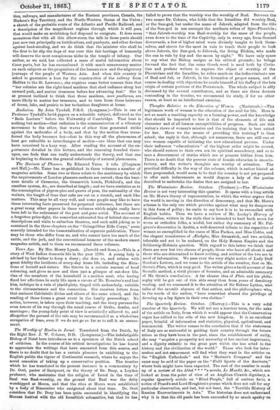The Westminster Review. October. (Trubner.)—The Westminster Review is not very
interesting this quarter. It opens with a long article on Mr. Hare's theory of representation, in which the writer argaos that the world is moving in the direction of democracy, and that Mr. Hare's scheme is the only one which provides against what may be dangerous in this form of polity ; he omits to say how it is to be reconciled with English habits. Then we have a review of Mr. Lecky's History of Rationalism, written in the style that is intended to hurl back scorn for scorn at orthodox folks, a useful, but rather dry summary of Mr. Pal- grave's discoveries in A,rabia, a well-deserved tribute to the capacities of women as exemplified in the cases of Miss Parkes, and Miss Cobbe, and the elegant translatress of .zEschylus, Miss Swanwick, and two articles, tolerable and not to be endured, on the Holy Roman Empire and the Schleswig-Holstein question. With regard to this latter we think that there are now but two classes of people, those who know all about it and those who are determined to know nothing, and neither of the two are in need of information. We pass over the very slight notice of Lady Daff
Gordon's Letters, and we come to the article of the number, that on Mr. Grote's Plato, which is very good. The writer gives a lucid account of the Socratic method, a vivid picture of Socrates, and an admirable summary of Mr. Grote's conclusions. A far clearer idea of Plato and his philo- sophy will be got out, of this able essay than from years of desultory reading, and we commend it to the attention of Sir Bulwer Lytton, who talks of the moonlit abysses of that author, and the philosophers who, in the words of the author, " have somewhat abused the privilege of dressing up a lay figure in their own clothes."






























 Previous page
Previous page